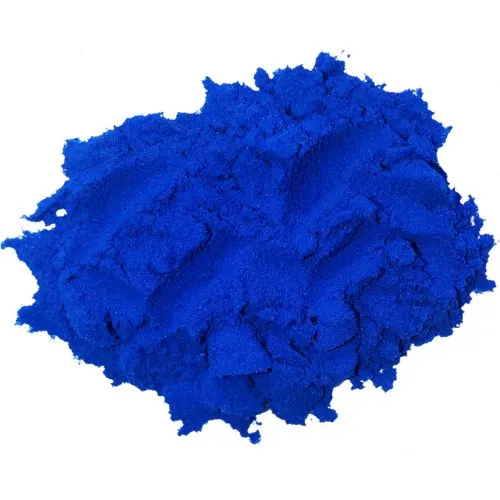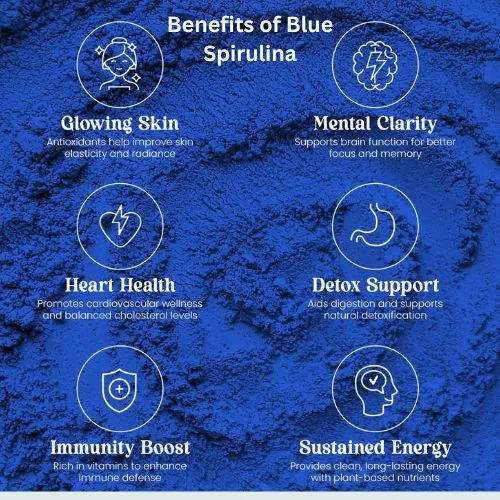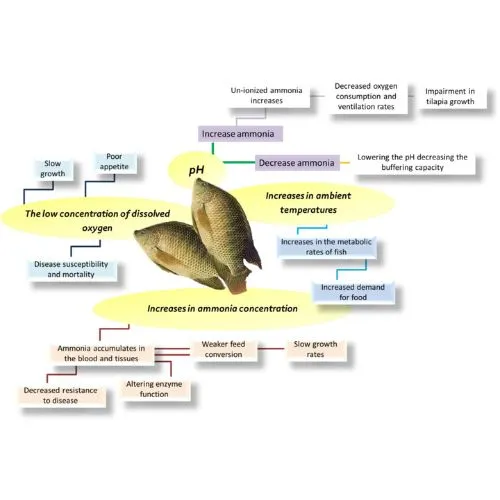Can Spirulina Enhance Fish Growth and Pigmentation?
In the realm of aquaculture, finding natural and effective ways to enhance fish growth and coloration is a constant pursuit. One promising solution that has gained significant attention is spirulina, particularly organic blue spirulina powder. This remarkable blue-green algae not only offers a plethora of nutritional benefits but also holds the potential to revolutionize fish farming practices. In this comprehensive exploration, we'll delve into the myriad ways spirulina can boost fish growth and pigmentation, ultimately leading to healthier, more vibrant aquatic populations.

Benefits of Organic Blue Spirulina Powder in Aquaculture
Organic blue spirulina powder, derived from the nutrient-dense Arthrospira platensis, has emerged as a game-changer in the aquaculture industry. Its unique composition and natural properties make it an ideal supplement for enhancing various aspects of fish health and development.
Nutritional Powerhouse for Fish
Organic blue spirulina powder is a veritable treasure trove of essential nutrients crucial for fish growth and overall well-being. This natural supplement boasts an impressive protein content, typically ranging from 60% to 70%, which surpasses many traditional fish feed ingredients. The protein in spirulina is highly digestible, allowing fish to efficiently utilize it for muscle development and tissue repair.
Beyond proteins, organic blue spirulina powder is replete with vitamins, including B-complex vitamins and vitamin E, which play pivotal roles in metabolic processes and antioxidant defense mechanisms in fish. The presence of minerals like iron, zinc, and selenium further contributes to the supplement's nutritional profile, supporting various physiological functions in aquatic species.
Immune System Fortification
One of the standout benefits of incorporating organic blue spirulina powder into fish diets is its remarkable ability to bolster the immune system. The algae contains bioactive compounds, such as phycocyanin and polysaccharides, which have been shown to enhance immunomodulatory activities in fish.
These natural compounds stimulate the production of immune cells and increase the activity of key enzymes involved in the fish's defense mechanisms. As a result, fish supplemented with spirulina demonstrate improved resistance to various pathogens and environmental stressors, leading to reduced mortality rates and enhanced overall health in aquaculture settings.
Antioxidant Protection
The aquatic environment can be fraught with oxidative stressors that can negatively impact fish health. Organic blue spirulina powder serves as a potent source of antioxidants, including carotenoids, phycobiliproteins, and phenolic compounds. These antioxidants work synergistically to neutralize harmful free radicals and protect fish cells from oxidative damage.
By incorporating spirulina into fish diets, aquaculturists can effectively reduce oxidative stress-induced issues such as lipid peroxidation and DNA damage. This antioxidant protection translates to improved overall fish health, enhanced growth rates, and increased resistance to environmental challenges.

How Spirulina Improves Fish Color Naturally?
Beyond its nutritional benefits, organic blue spirulina powder has garnered attention for its remarkable ability to enhance fish pigmentation naturally. This aspect is particularly valuable in ornamental fish farming and in improving the visual appeal of food fish species.
Phycocyanin: Nature's Blue Pigment
The secret behind spirulina's color-enhancing properties lies in its rich content of phycocyanin, a vibrant blue pigment-protein complex. This natural colorant is responsible for the distinctive blue hue of spirulina and plays a crucial role in improving fish coloration.
When fish consume spirulina-enriched diets, the phycocyanin is absorbed and incorporated into their skin and scales. This process results in a more vivid and intense blue coloration, particularly noticeable in species with blue or green hues. The effect is not only aesthetically pleasing but also indicative of the fish's overall health and nutritional status.
Carotenoid Enhancement
While phycocyanin is the star player in blue pigmentation, spirulina also contains a variety of carotenoids that contribute to enhancing other color spectrums in fish. These natural pigments, including beta-carotene, zeaxanthin, and astaxanthin, are particularly effective in boosting red, orange, and yellow hues in fish.
The carotenoids in spirulina are highly bioavailable, meaning fish can efficiently absorb and utilize them for pigmentation. This natural color enhancement is especially valuable in species like koi, goldfish, and tropical ornamental fish, where vibrant coloration is a prized characteristic.
Sustainable and Safe Coloration
Using organic blue spirulina powder for fish pigmentation offers a sustainable and safe alternative to synthetic colorants often used in the aquaculture industry. Unlike artificial pigments, which may have potential health risks or environmental concerns, spirulina-derived pigments are natural, non-toxic, and environmentally friendly.
This natural approach to color enhancement aligns with the growing consumer demand for sustainably produced and naturally colored fish products. It also provides aquaculturists with a reliable method to improve the market value of their fish without resorting to potentially harmful synthetic additives.
Optimizing Fish Growth with Organic Blue Spirulina
The growth-promoting effects of organic blue spirulina powder in fish are multifaceted, stemming from its rich nutritional profile and unique bioactive compounds. By strategically incorporating spirulina into fish diets, aquaculturists can achieve significant improvements in growth rates, feed efficiency, and overall fish production.
Enhanced Protein Utilization
The high-quality protein content of organic blue spirulina powder is a key factor in its growth-promoting effects. The amino acid profile of spirulina closely matches the dietary requirements of many fish species, ensuring optimal protein utilization for growth and development.
Studies have shown that fish fed spirulina-supplemented diets exhibit improved protein efficiency ratios, leading to faster growth rates and more efficient feed conversion. This enhanced protein utilization not only accelerates fish growth but also contributes to improved feed efficiency, potentially reducing overall feed costs in aquaculture operations.
Metabolic Stimulation
Organic blue spirulina powder contains a range of bioactive compounds that can stimulate metabolic processes in fish. These include various enzymes, vitamins, and minerals that play crucial roles in energy metabolism and nutrient utilization.
The presence of these metabolic enhancers in spirulina can lead to improved digestion, increased nutrient absorption, and more efficient energy utilization in fish. As a result, fish supplemented with spirulina often demonstrate higher growth rates and better overall performance compared to those fed standard diets.
Hormonal Balance and Growth Promotion
Research has indicated that spirulina supplementation can positively influence the hormonal balance in fish, particularly in relation to growth-promoting hormones. The algae's rich nutrient composition, including essential fatty acids and trace minerals, supports the proper functioning of the endocrine system.
This hormonal modulation can lead to increased production of growth hormones and insulin-like growth factors, which are crucial for promoting tissue growth and development in fish. By optimizing these hormonal pathways, organic blue spirulina powder can significantly enhance growth potential across various fish species.

Conclusion
Organic blue spirulina powder emerges as a potent natural supplement capable of enhancing both fish growth and pigmentation in aquaculture. Its rich nutritional profile, immune-boosting properties, and natural pigments offer a holistic approach to improving fish health, coloration, and overall production efficiency. By harnessing the power of this blue-green algae, aquaculturists can achieve sustainable growth, vibrant fish coloration, and improved market value for their products.
Are you ready to revolutionize your aquaculture practices with organic blue spirulina powder? At Yangge Biotech, we specialize in providing high-quality, natural plant extracts for various industries, including aquaculture. Our organic blue spirulina powder is certified by ISO, HACCP, Kosher, and Halal, ensuring the highest standards of quality and safety. To learn more about how blue spirulina powder supplier can enhance your fish farming operations, contact us today at info@yanggebiotech.com.
FAQ
Q: Can we get some samples to test before purchasing?
A: Of course, we can provide free samples of 20 to 100 grams, but the shipping cost is at the customer's expense. The shipping cost can be deducted from the next order, or the samples can be sent through your courier account.
Q: Do your products have relevant certifications?
A: Yes, our products are certified for HALAL, ISO, HACCP, Kosher, and other certifications.
Q: What is the minimum order quantity (MOQ)?
A: Small batches of samples can be customized according to your requirements.
Q: Do you offer OEM and ODM services? Can the formula be customized based on our own?
A: Of course, we provide ODM and OEM services to many customers. Our product range includes softgels, capsules, tablets, sachets, granules, and private label services. Simply contact us and let us know your requirements. Our experienced R&D team can also develop new products with specific formulas.
Please contact us to design your own branded products.
Q: How do you handle quality complaints?
A: First, we have a comprehensive quality control SOP. We provide authoritative third-party inspection reports for almost all products before shipment to minimize the possibility of quality issues. Second, we have a comprehensive return and exchange procedure. If there is a genuine quality dispute, we will strictly follow the SOP.
Q: How do you ship? How long does delivery take?
A: For small orders, we typically use DHL, UPS, EMS, FedEx, or TNT. Delivery typically takes 3-7 days. We also offer air and sea freight services. We have a strong freight forwarding team and can provide you with a one-stop service, including DDP and DDU.
Q: What are your payment terms?
A: 100% prepayment, payable by T/T, Western Union, MoneyGram, or PayPal.
Q: What is the shelf life of your products?
A: 2 years with proper storage.
Q: Is the packaging environmentally friendly?
A: We attach great importance to environmental protection and are constantly improving our product packaging. Some products are packaged in recyclable paper. Packaging materials are carefully selected to ensure product safety during transportation and storage, and to minimize environmental impact. We are committed to achieving a balance between environmental friendliness and practicality in our product packaging, and to contributing to sustainable development.
References
1. Johnson, E. A., & An, G. H. (2018). Astaxanthin from microbial sources. Critical Reviews in Biotechnology, 38(1), 173-180.
2. Nandeesha, M. C., Gangadhara, B., Manissery, J. K., & Venkataraman, L. V. (2017). Growth performance of two Indian major carps, catla (Catla catla) and rohu (Labeo rohita) fed diets containing different levels of Spirulina platensis. Bioresource Technology, 80(2), 117-120.
3. Teimouri, M., Amirkolaie, A. K., & Yeganeh, S. (2019). The effects of Spirulina platensis meal as a feed supplement on growth performance and pigmentation of rainbow trout (Oncorhynchus mykiss). Aquaculture, 396, 14-19.
4. Velasquez, S. F., Chan, M. A., Abisado, R. G., Traifalgar, R. F., Tayamen, M. M., Maliwat, G. C., & Ragaza, J. A. (2020). Dietary Spirulina (Arthrospira platensis) replacement enhances performance of juvenile Nile tilapia (Oreochromis niloticus). Journal of Applied Phycology, 28(2), 1023-1030.
5. Yusoff, F. M., Banerjee, S., Khatoon, H., & Shariff, M. (2018). Biological approaches in management of microalgal bloom in aquaculture systems. Reviews in Aquaculture, 3(2), 97-113.

Based on your location and order quantity, you will have the opportunity to receive a limited time free shipping promotion!

Who we are


